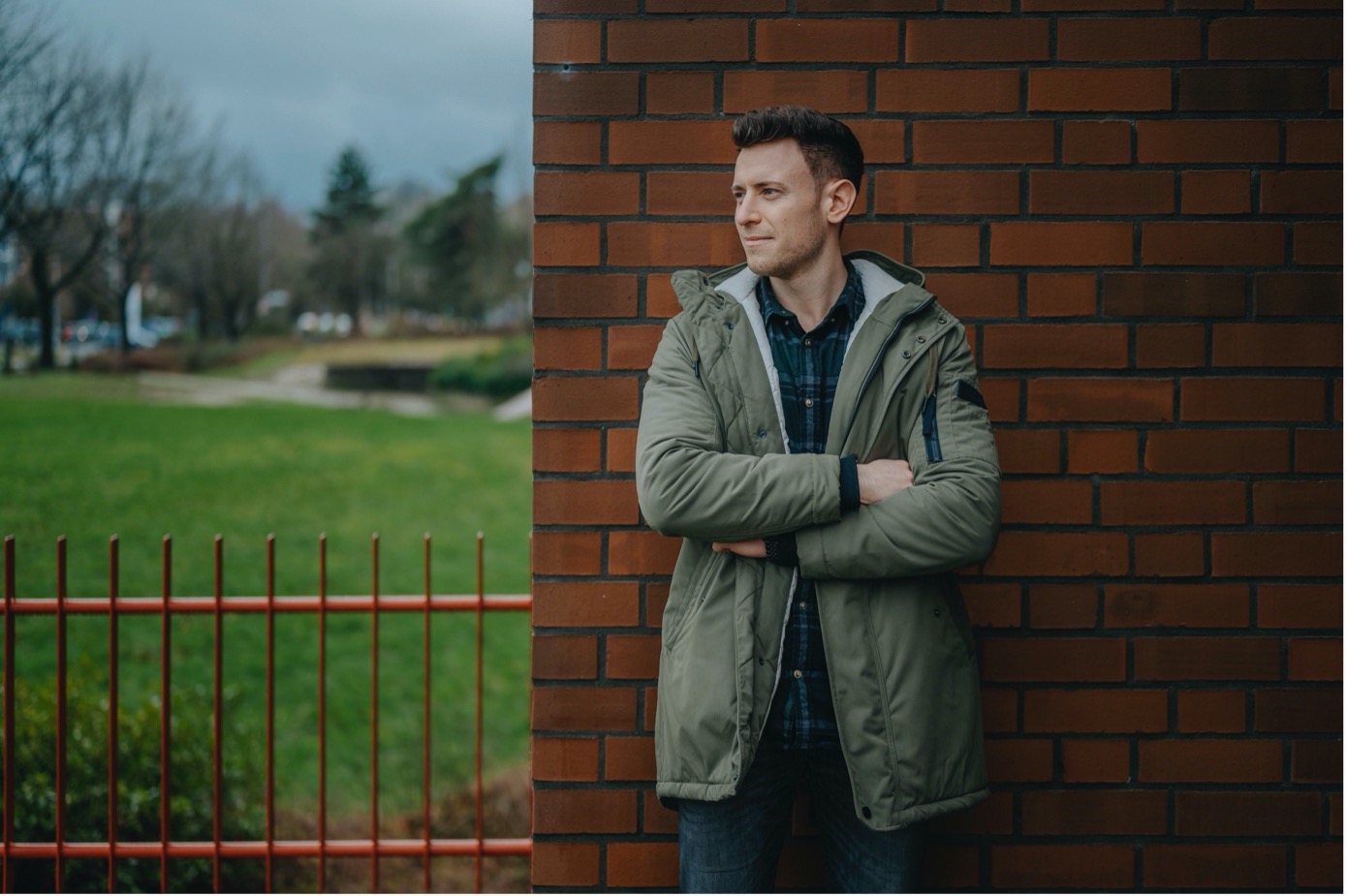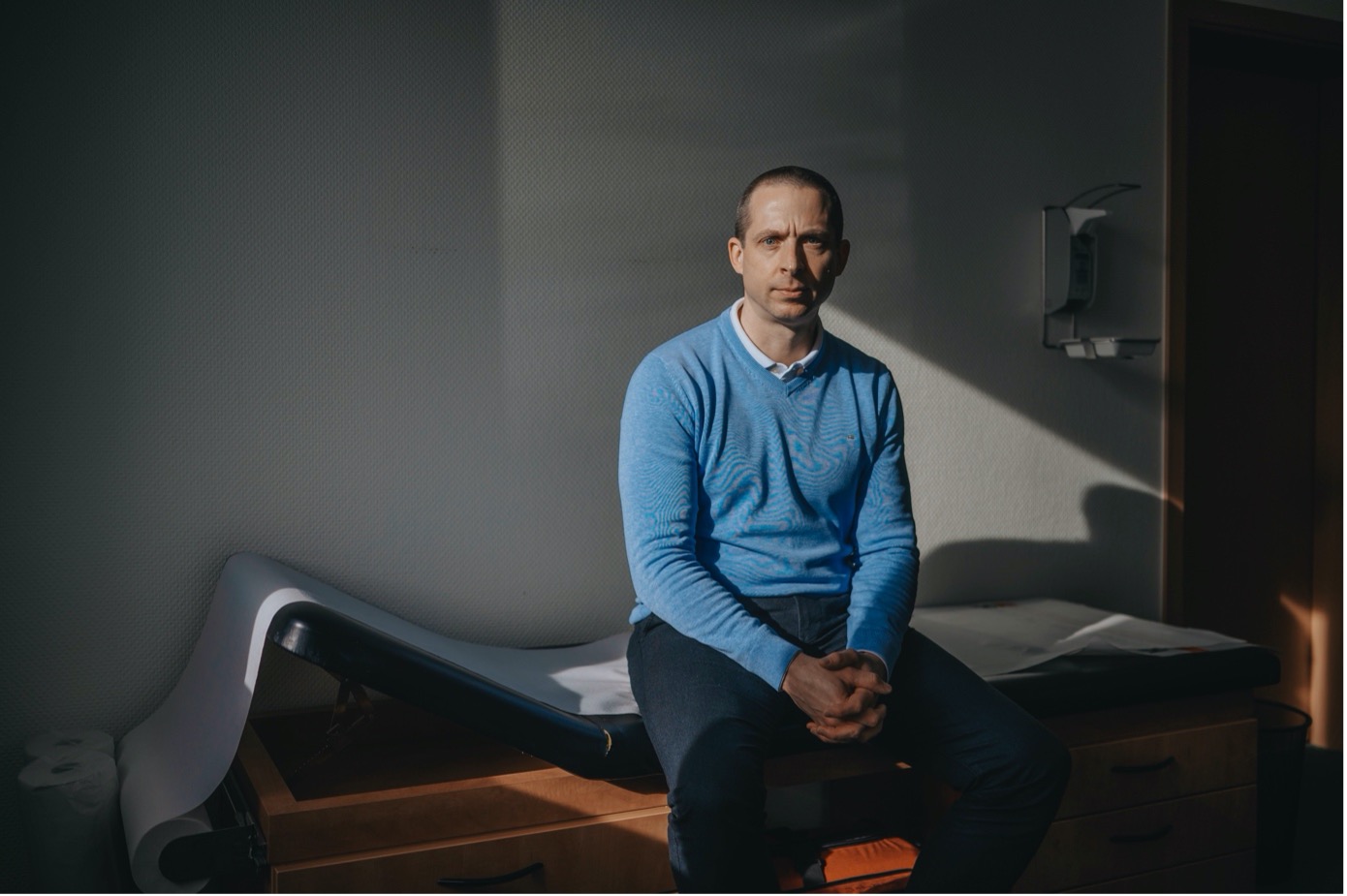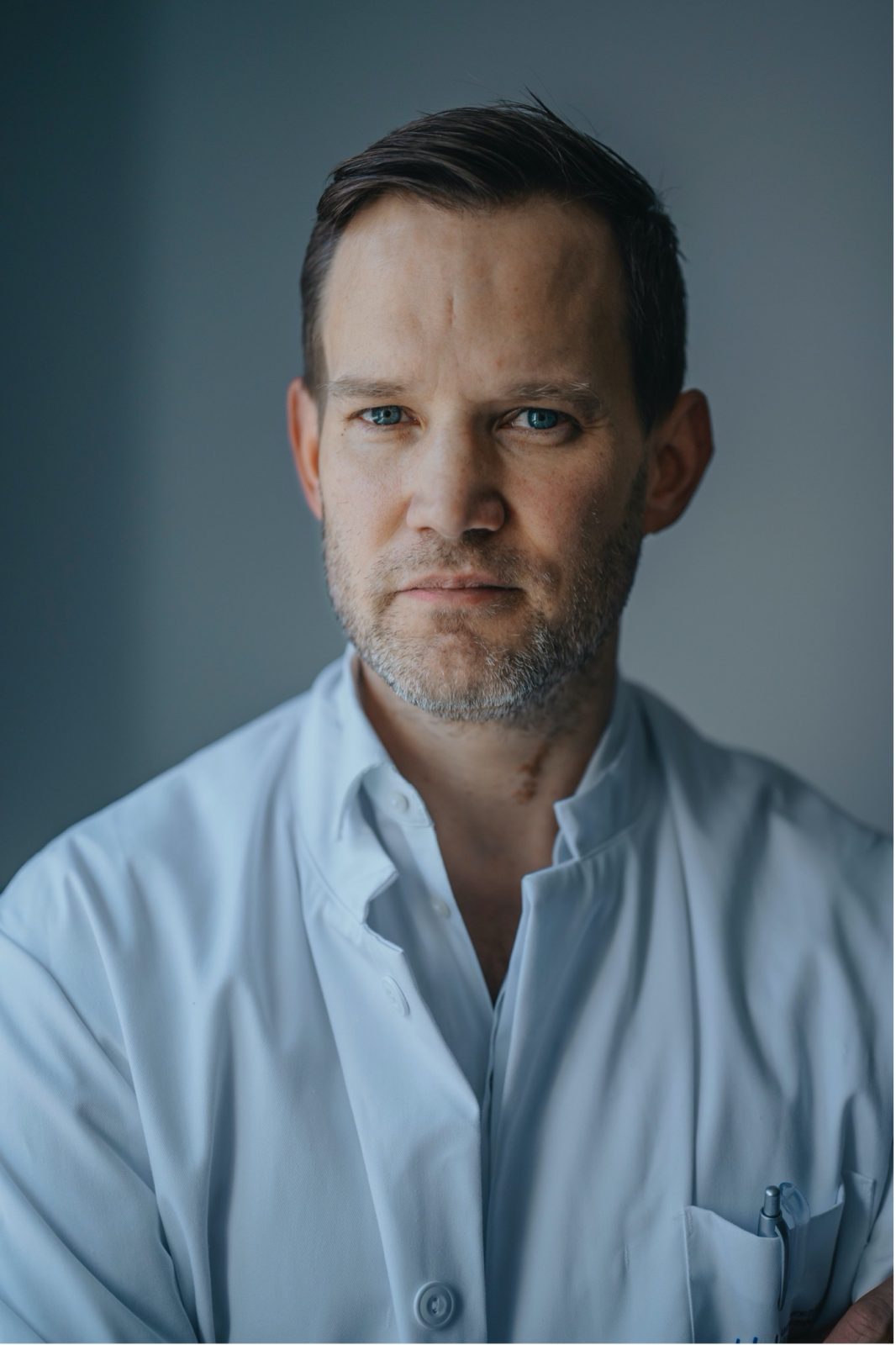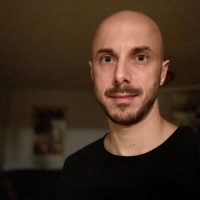Distinguished
Reporting
Award
The First Hotspot
published by Der Spiegel, Germany
SPIEGEL: Herr Bougie, soon after corona broke out in the Heinsberg district, the whole country knew the story of your brother Bernd. He had attended a traditional Karneval variety show on 15 February 2020 and, unbeknown to him, was carrying the virus. What are the implications for your family?
René Bougie: We were at the centre of a storm. My brother was not seen as a victim, as someone who had caught the coronavirus and was severely ill, but as The One Superspreader. Politicians and the media put together a profile of the perpetrator: a married family man with a pre-existing health condition spreading the virus because of his Karneval party excesses.
SPIEGEL: And that is not true?
René Bougie: No.

Heinsberg District, Germany
Heinsberg district spreads across low-lying farmland, at the very western edge of Germany. Redbrick houses, neat front gardens. Right on the Dutch border lies the village of Gangelt. René Bougie lives in the Birgden part of the municipality, his brother Bernd in nearby Langbroich. Right by the fire station in Quellstraße is the village hall, the venue for the annual comedy extravaganza of the village Karneval association “Langbröker Dicke Flaa.”
Bernd Bougie and his wife Elke were the first cases of Covid 19 that were reported in North-Rhine Westphalia. That was on 25 February 2020, ten days after the Karneval bash, one day after Shrove Monday. One week later 83 cases had been reported in the district, three days after that the number was 199, another five days later 369.
Heinsberg district became Germany’s first Hotspot. In Britain, The Times reported on it as the “German Wuhan;” one Facebook comment called for somebody to nuke Heinsberg with an atomic bomb.
The virus was unstoppable. On 18 March Angela Merkel told the nation on television that it was of existential importance to shut down public activities to “slow the spread of the virus through Germany.” Bavarians First Minister Markus Söder said: ”We must not allow a second Heinsberg to happen.”
Heinsberg will likely remain synonymous with the start of the pandemic in Germany forever. The Haus der Geschichte Museum in Bonn exhibits a blue brewery wreath and green drink tokens that were used at the Karneval meeting.
To find out what happened at the time, SPIEGEL spoke to people present at the Karneval party: virologist Hendrik Streeck, who carried out research on the event, and with doctors, politicians and local businesses.
When trying to deal with the virus and the people it affects, it is helpful to look back.

The Karneval Extravaganza, Gangelt, 2020
The Karneval Extravaganza
On 15 February, the village hall had been decorated with red and white garlands; seven spotlights illuminated the stage. At the front row of tables sat the “Council of Eleven,” the local dignitaries of the comedy association, sporting their ceremonial cocked white fool’s caps. The beer hall tables filling the room could seat some 300 people. A village party where everybody knows each other, with everyone joining in on the exuberant celebration: ideal conditions for the virus. At that time, the invisible danger still seemed far away.
At 19.11 hrs, the Majorette dance troupe filed in, after which came to the entrance of the official “Prince and Princess” of the silly season. The variety programme included 16 acts, from the Langbröker Rockemariechen to the Zwei Schwaadlappe.
Bernd Bougie was seated at a front table on the left. He had arrived with a group of friends just before 18 hrs to get good seats. Of the ten people seated at his table, at least seven later tested positive for corona, or were found to have antibodies in their blood.
That evening, Bougie felt a slightly irritating cough.

Stephan Ritterbex. Marcus Simaitis / DER SPIEGEL
Stephan Ritterbex, 30, had dressed up as a Roman legionary. He remembers that he sat on the right, second row, third table. He used a glass to collect coins from his friends to pay for the round of beer that the waiter had brought. Ritterbex tried to catch some of the roses that someone was throwing from the stage. At one point, he was standing up on the beer house bench, linking arms with others, “schunkling” with the music and singing along. The following day he celebrated “Old Wives Karneval day,” went to the pint-before-noon meeting at his local and lined the road to watch the Karneval procession. On 28 February, he took a bite of a banana and tasted nothing.

Lisa Oliveira. Marcus Simaitis / DER SPIEGEL
Towards 21 hrs, his colleague Lisa Oliveira took to the stage with her Pure Poisen dance group, wearing a green wig. The Council of Eleven were clapping along to the rhythm of Sweet Dreams, and the band emphasised the end of the performance with a flourish. Lisa Oliveira, 20, only stayed for two hours, she was not infected.
After the interval came one of the high points. The “Daredevils” had been a fixed element of the annual extravaganza for six years: 13 men in black pants and white shirts, Bernd Bougie amongst them. They danced for nine minutes, in rows, in a line, whirling each other about. Bougie coughed once.
The final act just before midnight brought nearly all the performers back on stage, in a joint chorus. Nine days later Bernd Bougie was admitted to the hospital.

Stephan Pusch. Marcus Simaitis / DER SPIEGEL
The Crisis Manager
On Shrove Tuesday, the day following “Rose Monday,” Stephan Pusch was lying on the sofa in his living room. The local CDU council leader had caught a cold. That was when his deputy called and said “We have two corona cases. They are in the hospital, one of them on a ventilator,” Pusch recalls today.
He drove to his office at the council hall and called a meeting of the Crisis Committee. He learned that the patients were Bernd Bougie and his wife, that the couple had been at the Karneval extravaganza, that Bougie had been one of the dancers on stage, and that his wife works at a child daycare centre.
The Crisis Committee decided to close all schools and kindergartens with immediate effect.
Early in the morning on Ash Wednesday, Push recorded a video that he posted on Facebook appealing to the people of Heinsberg to keep their distance, avoid large gatherings and to keep calm.
He then drove to Düsseldorf to meet with North Rhine Westphalian state health minister Karl-Josef Laumann and with staff from the Robert Koch Institute. In the evening, Pusch was contacted by Federal Health Minister Jens Spahn.
That was when he knew that something big was happening, says Pusch.
The Crisis Committee ordered around 1,000 people to go into quarantine. On one of the streets, all residents but two families had to stay inside their houses. Those who were still allowed to move about freely went to place eggs and milk on their neighbours’ doorsteps. There are some inhabitants of Heinsberg who have been in quarantine four times by now.
Pusch set up a citizens’ hotline, open from 8 hrs to 20 hrs. During the first three days, 3,000 citizens called the number. They wanted to know where they could get tested, if they were still allowed to travel. They said that in Aix-la-Chapelle they had received verbal abuse, and as they went shopping across the border in the Netherlands they had their cars vandalised by scratching.
Mail-order companies refused to send goods to the district, into the plague zone. One Heinsberg business that supplies automotive companies throughout Germany saw its orders collapse. To hide their location, the manager tried to set up a subsidiary in Düsseldorf with a separate address and telephone number.
The Crisis Committee met every day in room 335 of the local hospital on the third floor, sitting at tables arranged in a horseshoe formation. At the centre of the room, they placed a map of Germany that showed Heinsberg as the Gallic Village from the Asterix Comics. We will not be defeated, was the message.
A representative of the Thai embassy asked how many of his compatriots had tested positive in Heinsberg. The New York Times and Al Jazeera requested information. Suddenly, the whole world knew about Heinsberg.
Pusch went for transparency, for communication. His Facebook videos he called “Pusch-Notifications”, using the hashtag #hsbestrong. »HS« is the Heinsberg car registration code. To a news report by the WDR public broadcaster that parts of Heinsberg would be closed off as restricted areas Pusch replied: “As long as I have a say in how things are run here, there will be no closing-off of anything.”
The three hospitals in the district were using 4,000 PPE gowns and 8,700 masks per day. Stocks were running low. The German army first refused Pusch’s request for help. After he negotiated with the government of this State, they sent only 900 masks in four weeks.
Someone in the District Council administration had identified a source of supply in Turkey, after which a large order was placed and a down payment was made. A member of staff says the supplier later phoned the hospital and told them that the lorry had been robbed on its route through the Balkans. Masks gone. Money gone.
At home, Pusch had an idea. He wrote a letter to the Chinese president, Xi Jinping, and received a reply from the ambassador: “The Great Chinese People have heard your cry for help.” China sent 15,000 surgical masks.
Some eleven months later, Stephan Pusch is sitting in his office, the virus still running wild. By late January, the official toll in the district stood at 7,917 corona infections, with 254 people having died of or with the virus. But there is a difference compared to the previous spring: Heinsberg is no longer alone.
Pusch says: “The surrounding region, the state of North Rhine Westphalia, the whole of Germany acted as if the virus was mainly our problem. That always puzzled me.”
In reality, Heinsberg served as the dress rehearsal for the rest of Germany.
At the local elections in September, Pusch received nearly 80 per cent of the vote. In October, he was awarded the Order of Merit of the Federal Republic of Germany for his fight against corona.
Pusch says he is still processing what happened. During his summer holiday, he found it difficult to concentrate on a book for even half an hour. In order to dial down, he now regularly spends time in his small workshop doing woodwork.

Christian Hoppe. Marcus Simaitis / DER SPIEGEL
The Medics
The pandemonium erupted simultaneously in two places in the Heinsberg region. They are 15 kilometres apart: the surgery of Christian Hoppe, GP in Gangelt, and the Heinsberg district hospital headed by chief consultant Günter Mertens.
At the time, Hoppe received calls from people who said they had been in contact with the Bougies and wanted a corona test. Hoppe took swabs outside in the car park, wearing a mask, goggles, PPE gown. On day one he had 3 positive cases, the next day 11. After 14 days, there were more than 100. Hoppe was so busy that he asked the Telekom phone provider to activate an additional three lines for him.
A second virus began to spread in the Heinsberg region: Fear.
There was not a man nor a woman who had not been celebrating Karneval. And nearly everyone knew someone who knew someone who had been at the Karneval extravaganza. Everyone wanted a test. “We were overwhelmed,” says head consultant Mertens. The hospital management called in two doormen, as a precaution.
GP Hoppe ordered PPE clothing from England; he drove to DIY stores in the Netherlands to replenish supplies. Now, nearly a year later, he is sitting in his surgery talking about the hectic times.
He and his colleagues paid some 4,000 euros for materials including masks, gowns, and disinfectants out of their own pockets.
One of his assistants had tested positive; she had been celebrating Karneval. So the GP had to close his surgery: quarantine. By and by, other GPs in the area had to close due to cases of corona infection.
Over the following weeks, the Crisis Committee decided that doctors and their staff were allowed to work as long as they did not show any symptoms. Hoppe says: “Another two days and the medical care provision would have collapsed.”
One evening at the hospital Günter Mertens was looking at a patient’s x-ray. It showed the lungs of a man in his early sixties. In the image Mertens saw white streaks, the patient’s alveoli were completely obstructed with mucus.
Mertens was confused by the fact that a day earlier, the lungs had looked normal. He knew immediately, he says now, that this was nothing like ordinary pneumonia. “At first we were extremely puzzled by this disease. And to be honest, we are still puzzled.”
The intensive care unit is equipped with eight beds with ventilation. Just a few days after Karneval, every one of them was occupied. Mertens asked hospitals in Cologne, Düsseldorf and Aix-la-Chapelle to take on Covid-19 patients. In some cases, it worked.
The hospital set up its own corona ward with 30 beds. Within a few hours, a carpenter had constructed additional air-locks for the ICUs. He built small antechambers where nurses and doctors could change and disinfect their hands.
By mid-March, Heinsberg hospital had 43 Covid patients.
Christian Hoppe’s greatest worry was that he might carry the virus home with him. At the time his baby was two months old. For seven weeks he did not touch the infant. He had his own bedroom, ate at a separate table, kept a distance from his wife and the older child.
At his surgery, Hoppe now points at a stack of paper some ten centimetres thick. Faxes that he received from the North Rhine registered practitioners’ association, with recommendations on who should be tested and who shouldn’t and how to act.
“Some days the recommendations that arrived in the morning were outdated by the afternoon,” says Hoppe. So he had to call people whom he had told that they did not need a test and make an appointment for them. This went on and on.
Mertens also had difficulties keeping the big picture in sight.
He was reading the publications by the WHO and the Robert Koch Institute. The RKI recommended that hospitals should admit anyone with a suspected corona infection. “I thought: ‘impossible’.”
He studied the publications of the German Society for Intensive Care Medicine. They were dealing with ventilation strategies. He realised that these had been written by people who presumably had never seen a Covid-19 patient.
By the beginning of April, the number of hospital patients was falling again. There were people in Heinsberg who got infected but did not feel anything. There were those with aching bones, stomach upsets, fever, headaches. Others had inflammation of the heart muscle. Some severe cases still suffer from damaged kidneys, destruction of the liver, have a stoma, need a walking aid, have trouble finding words.
Hoppe says that “the people in Heinsberg have learned a lesson that they did not deserve.” They are more restrained and cautious now than people in other places.
Head consultant Mertens says he is proud that they were able to provide a ventilator for each patient who needed it. But one thing still gets to him: “At the beginning I thought, we just have to make it through the first few days, medically. Then the cavalry will arrive, the RKI and the Health Ministry will send their people.” He was hoping for help. “But nobody came, not to this day.”
The Alleged Superspreader
Bernd Bougie, the presumed Patient Zero of the Karneval extravaganza, does not want to talk about last year’s events. He is not ready yet, maybe he will never be. René Bougie has agreed to a conversation, on the condition that the article will not give details of his brother’s health.
Both are estate agents, there is an air filter humming away in the meeting room at their office. René Bougie takes off his glasses and puts them on the table. It is the first time that someone in the family is talking to journalists. He says his brother went home early on the Monday after the Karneval show because he was feeling unwell.
SPIEGEL: Did your brother see a doctor?
Bougie: Of course. During the week following the Karneval show, he had contact with four or five doctors and paramedics. None of them recognized that he had Covid. They said he had pneumonia and should stay in bed. Nobody really had the virus on their radar, not even the doctors.
SPIEGEL: What did you think?
Bougie: I was skiing in Carinthia. On Friday, we talked on the phone. My brother had collapsed and called the emergency doctor. But the doctor left him at home. By Sunday my brother could hardly speak. Then it was decided on Shrove Monday that he should refer himself to the hospital. And that is what he did.
Late on Shrove Monday, René Bougie learned that the medics at the hospital had put his brother into an induced coma. He cut his holiday short and returned home to Gangelt.
On the following day at 17 hrs, it was known that Bernd Bougie was corona-positive. The same night René Bougie compiled a document listing the addresses of people his brother had been in close contact with through his work during the 14 days preceding his first symptoms. He found 43 names.
Bougie says the Heinsberg Crisis Committee did not want the list, just the names of colleagues at the office. Bougie says he fails to understand why.
The night before Ash Wednesday, Bernd Bougie was transferred to an isolation ward at Düsseldorf University Hospital and connected to an artificial lung. His wife was transferred with him. She had also tested positive but was not as severely ill as her husband. He needed ventilation for several weeks.
During the night from Ash Wednesday to Thursday, René Bougie wrote an email to council leader Pusch. Earlier, there had been news reporters standing outside his house; a tabloid journalist phoned, pretending to be a client of this company.
René Bougie was angry. In his view, Pusch and the North Rhine Westphalian state health minister Laumann had implied in public that his brother himself was the sole cause of the outbreak. “As if a little bird had dropped the virus on him,” says Bougie. They had given the impression, he says, that after the Karneval show his brother continued to party excessively. “But long before Rose Monday, he was ill in bed at home.”
In his email to Pusch he wrote: “My brother is merely the victim of a virus that is spreading globally.”
It was only then, he says, that Pusch expressed the sympathetic attitude that was warranted.
Bougie is annoyed by the fixation on his brother and his brother’s wife, while at the same time Germany already had 27 confirmed corona cases. People got it into their heads that his brother had a pre-existing health condition even though he had long since completely recovered from it.
The conclusion people wrongly jumped to was that the first person known to be infected must be the source of the spread of the disease.
Bougie sent an email to the German press agency DPA, because “the media pressure” on the family had increased “intolerably.” He clarified that his brother, contrary to reports, did not visit the Tropical Islands Leisure Park. He wrote that his brother had already been to a Karneval event on the day before the extravaganza. Bougie is still surprised that nobody took an interest in that event.
SPIEGEL: How did your brother deal with the allegation that he was the one who spread the virus in Germany?
Bougie: Please respect that I will not reply to that. The answer could reopen emotional wounds.
SPIEGEL: Where could your brother have gotten infected?
Bougie: When I learned later that I have antibodies I thought: maybe it was me, who knows? But I think it is no one’s place to decide who infected whom. Where do you stop looking for the source? At the border?
SPIEGEL: What do you wish politicians would have done?
Bougie: On 28 January, after Bavaria had the first case of corona in Germany, German health minister Spahn said the virus represented little danger. He advised a cautious attitude without being overly concerned. I would have wished that those responsible had stood up later and said: ‘We got it wrong in our assessment of the situation.’

Hendrik Streeck. Marcus Simaitis / DER SPIEGEL
The Study
For virologist Hendrik Streeck the Karneval extravaganza was a treasure trove. It gave him an opportunity to find out more about how the virus spreads. And the key to the treasure chest were the guests. In April, Streeck invited 350 people who attended the event to participate in a study: members of the audience, performers, catering staff. He asked them to inform all the others who were at the event.
Streeck received 411 offers to participate. He had never received such a response, he says. One morning in winter, he is sitting in his office at the Institute of Virology of Bonn University Hospital, looking at an open laptop computer. Streeck’s view is that people’s readiness to help was a reaction of defiance against the hostility they had to bear in Heinsberg.
Over 80 staff collected the data and analysed it. They approached the work like detectives, says Streeck, establishing a profile for each person who attended the event. At a school in Gangelt they took swabs and blood samples and asked questions: Where were you seated? Did you dance on the stage? When did you go to the lavatory? Did you share drinks with anyone? Did you hug anyone? Each guest was assessed using a so-called Proximity Score that showed how close they got to others in the hall.
Streeck wanted to find out if there was a correlation between the position of somebody’s seat and the likelihood of getting infected.
The windows of the village hall had been kept closed due to the noise. The hall had a simple air exchange system: the air was sucked in on the left side of the hall, mixed with fresh air, and blown out again at the right side. A kind of circulating pump.
Streeck opens a file on his laptop with a schematic view of the hall. Each table is colour coded, showing how many of the guests seated there had tested positive or formed antibodies. Seven tables are red or dark red, indicating that more than half of the people got infected.
Those on the stage or at the bar were at high risk. Those seated on the right side of the hall where the air was blown out were more likely to be infected than those on the left where the air intake was. That might be the reason why Stephan Ritterbex fell ill, the Roman legionary. Those who went outside during the interval or left early were less likely to test positive, like the dancer Lisa Oliveira, for example.
198 people who attended the extravaganza were found to have an acute infection or antibodies present, roughly 44 per cent. One of the guests died with or of coronavirus.
At the beginning of the study, Streeck assumed that one single person had spread the virus at the event. Patient Zero. “That theory was incorrect,” he says now. There had been several among the guests who had suffered from loss of sense of smell or taste. On the day after the event, some had been displaying more severe symptoms. Bougie was only one of them.
Streeck says: “The virus had already entered the Heinsberg district before the extravaganza.” He reckons it came via Belgium or the Netherlands.
This year the Karneval extravaganza was cancelled. Who knows if Karneval celebrations will ever be as carefree as they used to be?
They will, says René Bougie. The virus won’t succeed in driving out the Karneval.






